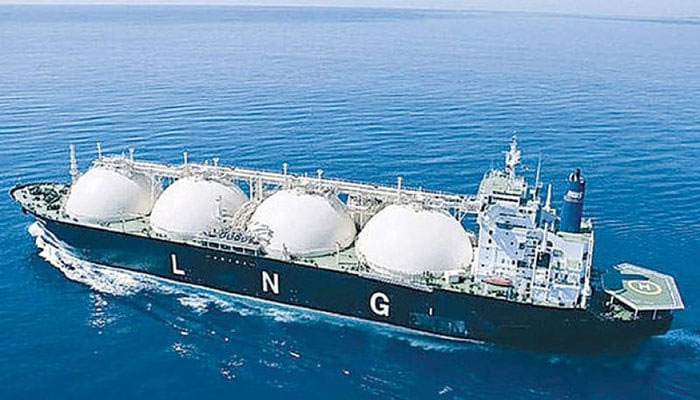Domestic sector to get 19 LNG cargoes of Rs232bn
Officials said out of Rs2.9 trillion circular debt, Rs1 trillion had been added just because of no increase in gas prices in the last 10 years
ISLAMABAD: The Petroleum Division’s top mandarins have taken a serious notice of massive diversion of RLNG to the domestic sector and asked the Sui Southern and Sui Northern gas companies to limit their diversion in such a way that it would not cause a massive increase in the overall gas prices and its cost could also be recovered easily.
“This time 19 LNG cargoes of Rs232 billion are estimated to be delivered to the domestic sector. However, after June 2024, the actual reconciled figures about RLNG diversion will surface. We are estimating that the RLNG cost would be hovering somewhere at Rs180 billion,” senior officials of the Energy Ministry told The News.
The Petroleum Division mandarins are seriously thinking of capping the RLNG diversion to the domestic sector. The official said the RLNG cost of Rs232 billion, estimated to be incurred on RLNG diversion from November 2023 to March 2024, was expected to be recovered from the domestic sector through the enforcement of limited WACOG (weighted average cost of gas) mode and two times hike in gas prices -- from November 1, 2023 and February 1, 2024.
However, the cost of RLNG diversion of Rs250 billion to the domestic sector during the period from FY19 to FY22 has not been recovered so far and it has become a part of the circular debt of Rs2.9 trillion.
Officials said out of Rs2.9 trillion circular debt, Rs1 trillion had been added just because of no increase in gas prices in the last 10 years.
“Ogra used to give determinations but the government avoided an increase in gas tariff and because of this very fact, Rs1 trillion has been added to the circular debt.”
On the issue of LNG transactions, the government is bound to pay the LNG cargo cost within 10 days after it is offloaded, but one month is consumed by the gas companies in the billing process, another 10 days are consumed in recovery of bills and 5-10 days are used in reconciling the bills.
The whole process consumes 50-60 days. When the recovery of gas bills takes place in 60 days, 6 cargoes are offloaded. So the government wants to cap the RLNG diversion limit to the domestic sector apart from improving the bill recovery.
Right now, there is a gap of 60 days between recovery and payment cycles, which haunts the government functionaries. The government wants the gas companies to borrow the working capital till the recovery of bills to pay off the LNG cargoes’ cost.
-
 Harry Styles Excites Fans As He Announces Release Date Of New Song
Harry Styles Excites Fans As He Announces Release Date Of New Song -
 Japan’s Ex-PM Shinzo Abe’s Killer Is Set To Be Sentenced: How Much Punishment Could He Face?
Japan’s Ex-PM Shinzo Abe’s Killer Is Set To Be Sentenced: How Much Punishment Could He Face? -
 Prince Harry, Meghan Markle’s Return To UK Could Create Royal Family Dilemma
Prince Harry, Meghan Markle’s Return To UK Could Create Royal Family Dilemma -
 Prince Harry Turns Troubled With No Sense Of Home: ‘Isolation Is Getting To Him Mentally’
Prince Harry Turns Troubled With No Sense Of Home: ‘Isolation Is Getting To Him Mentally’ -
 Vitamin D Link To Respiratory Diseases Will Shock You
Vitamin D Link To Respiratory Diseases Will Shock You -
 A$AP Rocky Gives His Take On Children's Budding Personalities
A$AP Rocky Gives His Take On Children's Budding Personalities -
 Elijah Wood On Return To 'Lord Of The Rings' Universe
Elijah Wood On Return To 'Lord Of The Rings' Universe -
 Princess Beatrice, Eugenie Resort To Begging Sarah Ferguson: 'It'll Bring Disaster For The Whole Family'
Princess Beatrice, Eugenie Resort To Begging Sarah Ferguson: 'It'll Bring Disaster For The Whole Family' -
 Jenny Slate Hails Blake Lively Amid Lawsuit Against Justin Baldoni
Jenny Slate Hails Blake Lively Amid Lawsuit Against Justin Baldoni -
 Sophie Wessex Shares 'frustration' From Early Days In Royal Family
Sophie Wessex Shares 'frustration' From Early Days In Royal Family -
 Jason Momoa's Aquaman Unseen Snap Revealed
Jason Momoa's Aquaman Unseen Snap Revealed -
 Prince Harry Taught Only Way King Charles 'will Take Him Seriously'
Prince Harry Taught Only Way King Charles 'will Take Him Seriously' -
 Meghan Markle’s Reaction To UK Talks With Prince Harry Comes To The Forefront: ‘Leaving Me?’
Meghan Markle’s Reaction To UK Talks With Prince Harry Comes To The Forefront: ‘Leaving Me?’ -
 Taylor Swift Slams Justin Baldoni In Explosive Text Messages, Court Filing Reveals
Taylor Swift Slams Justin Baldoni In Explosive Text Messages, Court Filing Reveals -
 Blake Lively’s Drops New Allegations Against Justin Boldoni About Birth Scene
Blake Lively’s Drops New Allegations Against Justin Boldoni About Birth Scene -
 Andrew's Reasons For Giving Sarah Ferguson A Rent-free Home For 30 Years After Divorce Finally Finds An Answer
Andrew's Reasons For Giving Sarah Ferguson A Rent-free Home For 30 Years After Divorce Finally Finds An Answer




